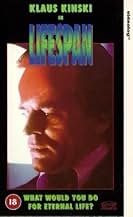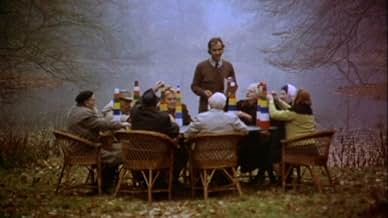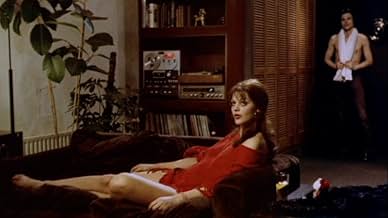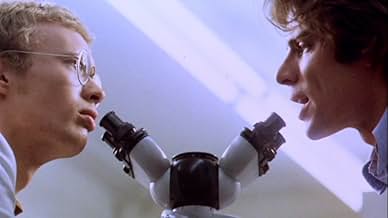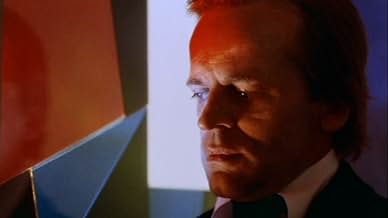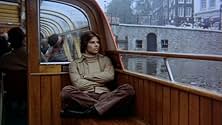Füge eine Handlung in deiner Sprache hinzuA doctor trying to develop a serum to lengthen life tries his formula out on the unsuspecting residents of an old-age home.A doctor trying to develop a serum to lengthen life tries his formula out on the unsuspecting residents of an old-age home.A doctor trying to develop a serum to lengthen life tries his formula out on the unsuspecting residents of an old-age home.
- Regie
- Drehbuch
- Hauptbesetzung
Frans Mulder
- Pim Henke
- (as Franz Mulder)
Dick Scheffer
- Official from ministry of science
- (as Dick Schefer)
Empfohlene Bewertungen
'Lifespan' is an interesting and low key film that may put viewers off when it misleadingly appears to be a horror movie starring Klaus Kinski, and fails to deliver just what the audience expects. The plot may deal with death, features a gruesome and creepy grave digging scene, and revolves around (a possibly) mad scientist, but it is in no way a horror movie. Even the description of "thriller" is a little off the mark. Many may find it too slow, but I think it suited the material. The other problem is that despite the video packaging on the old VHS copy I watched the legendary Kinski ('Nosferatu', 'Crawlspace', 'Venom') has only a small, albeit important, supporting role as "the Swiss man." The real star of the movie, though sadly he has little star power, is Hiram Keller ('Seven Death's In The Cats Eye') who plays Dr. Ben Land, a young and driven scientist who takes over the work of a dead colleague who was investigating halting the ageing process. Land becomes increasingly obsessed with his experiments, believing the older man was close to cracking the secret of immortality. While continuing the research he also begins an affair with the dead man's mistress (the sultry Tina Aumont, who played Helmut Berger's wife in the sexploitation classic 'Salon Kitty'), and begins to wonder just exactly what the shadowy "Swiss man" Ulrich (Kinski) has to do with it all. I enjoyed 'Lifespan' a lot more than I expected, especially once I shook off my horror expectations, and got over my disappointment at the relative lack of Kinski, the main reason I watched it in the first place. Keller makes a dull leading man, the ending is a bit anti-climactic and probably not to everyone's taste, but I say give it a go, you might find this odd movie to be as curious and watchable as I did.
This movie is hard to categorize. Klaus Kinski has a minor part, so it really can't be considered an important Kinski movie. It is not a horror film, with only one unsettling grave desecration scene. What it is, is an intelligently made sci-fi, that deals with the unique subject of trying to overcome death, by extending lifespans. Beautifully filmed in Amsterdam, the film has sharp editing, and narration that keeps things on track, Hiram Keller is the rather detached American scientist who is trying to unravel a dead colleague's immortality experiments. Klaus Kinski is the Swiss pharmaceutical company owner seeking death control for his own use. Tina Aumont is a love interest for both Keller and Kinski, with her totally gratuitous bondage scene unnecessary except perhaps for some titillating promotion. The ending leaves things hanging uncomfortably, but if you go in with realistic expectations, "Lifespan" will reward. - MERK
As the previous review states, "Lifespan" owes little to the genres of suspense or horror. Instead, it's a brainy, absorbing drama that's rewarding to those who give it a chance. Hiram Keller plays an American scientist picking up on the research of a colleague who committed suicide, and discovers he was on the verge of finding a cure to the aging process. Klaus Kinski is excellent (as always) in a small role as the owner of a sinister pharmaceutical company. The film plays out much like the early works of David Cronenberg (minus the violence and special effects); his fans should appreciate this. The only drawbacks, really, are an ambiguous ending (which actually fits the rest of the film), and the sometimes-corny, self-conscious voice-over narration. 3 stars out of 5.
Apart from featuring Klaus Kinski's name prominently on the DVD-cover, "Lifespan" also caught my attention because there were a lot of Dutch-sounding names in the cast. Indeed so, this bizarre cult co-production entirely takes place in the beautiful city of Amsterdam and the makers admirably took the effort to cast local actors and actresses for the supportive roles. It's a derivative and slow, but nevertheless compelling Sci-Fi/thriller about science's eternal quest for immortality. The ambitious American student Ben Land enrolls into the University of Amsterdam, eager to learn from his idol, Dr. Paul Linden, who allegedly stands on the verge of a medical breakthrough regarding prolonging human life. One day after Land's arrival, however, he finds Linden hanging in a noose from the ceiling (funny how the last thing he said to Land was: "tomorrow I'll be tied up"). With the support of the Dean, the brilliant and stubborn young student deep-dives into Linden's research and discovers successful results on lab mice and dubious experiments in old folks' homes. He also takes over the relationship with Linden's stunningly beautiful mistress Anna and learns about the connection with a mysterious Swiss pharmacist. "Lifespan" is tense and absorbing, but it seriously suffers from a lack of action, and particularly fans of horror & gore will be sorely disappointed! The film was released under the Mondo Macabro label but, like with "Crazy Love", I don't feel it really belongs among the other titles there. As for Klaus Kinski, this was clearly just another easy paycheck for him to cash in. Throughout half of the film, he only stands around and observes Ben Land from a distance. Later on, his role is slightly more extended, and he even gets to fondle ...'s beautiful naked body whilst wearing an antique death mask! You're the man, Klaus!
Despite the rather lethargic pace, this is an absorbing conspiracy thriller on an existentialist theme. As it was shot in English, even if most of the voices were eventually re-dubbed at a later stage, Fons Rademakers' heavy accent makes his dialogue hard to understand at times!
Anyway, many have found Hiram Keller's inexpressive performance a detriment to the film but I rather liked it (and so, apparently, does director Whitelaw!); the fact that a lot of the exposition is imparted through narration has been criticized as well, but I also thought this worked very well for the film. Much has also been said about the notorious (and oft-censored) bondage scene involving Tina Aumont (well cast here): actually, it's very discreetly done and pretty short in itself! And though Klaus Kinski doesn't get to exert his acting muscles a great deal, his Mephistophelean presence adds to the film's uniquely disquieting aura. Besides, the Amsterdam setting (and Eddy van der Enden's lugubrious photography of it) is a big plus, as is Terry Riley's electronic score.
Whitelaw's rather choppily edited interview and full-length Audio Commentary (moderated by Mondo Macabro's Peter Tombs) are very interesting: the director explains several points which may not have been very clear and draws attention to the irony which is present in his script. Besides recounting many an amusing anecdote about the production (Kinski turning up on set dressed as a Mexican bandit and Whitelaw having to calmly persuade him that his role of "The Swiss Man" was somewhat different!; Kinski's minimal dialogue was also the result of his dislike of the script, whereupon whole chunks of lines he was supposed to say were unceremoniously thrown out!) and the censorship problems the film encountered (the director tried to convince the U.K. censors that the bondage scene was relevant to the main theme by arguing that this kinky act highlighted a woman's breasts which, by storing milk, are themselves a symbol of immortality!). Whitelaw also puts the unresolved and apparently downbeat ending in the context of the film's theme by saying that a picture about immortality, i.e. the desire that one's life doesn't come to an end, could never have a conventional finish as that would mean it was actually embracing death! Interestingly, he mentions too that Roman Polanski (who was a member of the jury where LIFESPAN won an award) had admired the picture a lot - and this was eventually reflected in his own next film, THE TENANT (1976), to which it bears a striking resemblance plot-wise (though itself based on a work of fiction by Roland Topor, of which Whitelaw was completely unaware at the time)!!
Anyway, many have found Hiram Keller's inexpressive performance a detriment to the film but I rather liked it (and so, apparently, does director Whitelaw!); the fact that a lot of the exposition is imparted through narration has been criticized as well, but I also thought this worked very well for the film. Much has also been said about the notorious (and oft-censored) bondage scene involving Tina Aumont (well cast here): actually, it's very discreetly done and pretty short in itself! And though Klaus Kinski doesn't get to exert his acting muscles a great deal, his Mephistophelean presence adds to the film's uniquely disquieting aura. Besides, the Amsterdam setting (and Eddy van der Enden's lugubrious photography of it) is a big plus, as is Terry Riley's electronic score.
Whitelaw's rather choppily edited interview and full-length Audio Commentary (moderated by Mondo Macabro's Peter Tombs) are very interesting: the director explains several points which may not have been very clear and draws attention to the irony which is present in his script. Besides recounting many an amusing anecdote about the production (Kinski turning up on set dressed as a Mexican bandit and Whitelaw having to calmly persuade him that his role of "The Swiss Man" was somewhat different!; Kinski's minimal dialogue was also the result of his dislike of the script, whereupon whole chunks of lines he was supposed to say were unceremoniously thrown out!) and the censorship problems the film encountered (the director tried to convince the U.K. censors that the bondage scene was relevant to the main theme by arguing that this kinky act highlighted a woman's breasts which, by storing milk, are themselves a symbol of immortality!). Whitelaw also puts the unresolved and apparently downbeat ending in the context of the film's theme by saying that a picture about immortality, i.e. the desire that one's life doesn't come to an end, could never have a conventional finish as that would mean it was actually embracing death! Interestingly, he mentions too that Roman Polanski (who was a member of the jury where LIFESPAN won an award) had admired the picture a lot - and this was eventually reflected in his own next film, THE TENANT (1976), to which it bears a striking resemblance plot-wise (though itself based on a work of fiction by Roland Topor, of which Whitelaw was completely unaware at the time)!!
Wusstest du schon
- WissenswertesAt one point in the film, Tina Aumont is put into some "DNA helix" bondage as part of some consensual lovemaking with Dr. Land. Some bondage fans believe this is the first appearance of Japanese shibari bondage in a mainstream Western film.
- Alternative VersionenWhen released on VHS in 1987 in the UK, the BBFC made cuts of 1 minute 14 seconds to achieve an '18' rating. These cuts were waived when released again on video on 22 May 1995.
Top-Auswahl
Melde dich zum Bewerten an und greife auf die Watchlist für personalisierte Empfehlungen zu.
- How long is Lifespan?Powered by Alexa
Details
- Erscheinungsdatum
- Herkunftsländer
- Sprache
- Auch bekannt als
- Lifespan - Das Geheimnis des Lebens
- Drehorte
- Produktionsfirma
- Weitere beteiligte Unternehmen bei IMDbPro anzeigen
- Laufzeit1 Stunde 17 Minuten
- Sound-Mix
- Seitenverhältnis
- 1.85 : 1
Zu dieser Seite beitragen
Bearbeitung vorschlagen oder fehlenden Inhalt hinzufügen


